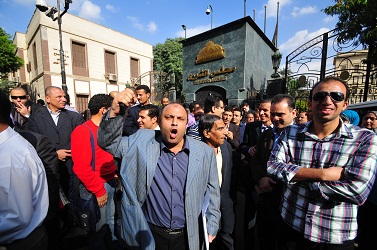CAIRO: Battling to regain their homeland and a national identity is, in all likeliness, at the top of Palestinians’ list of priorities, but smaller battles dominate their day-to-day lives. They are tackling the complex labyrinth of Israeli travel permits, passes and checkpoints, simply to get to and from the workplace. They have to fight the boredom brought on by lengthy curfews, and struggling to get the grocery shopping done in the mad rush to the stores, when the curfew is temporarily lifted.
But above all, in Suad Amiry’s recollection of her experiences living on the West Bank from the early eighties to the present, the biggest battle is holding on to your sense of humor. “Sharon and my Mother-in-Law is a tragicomedy of life under Israeli occupation and the determination to overcome the difficulties and frustrations of everyday life.
From the start, Amiry’s account is unexpectedly different from other diaries of Palestinian lives under the occupation. She exposes the occupation for the farce that it is. In her opening entry, she relates her encounter with Israeli security at Tel Aviv’s airport. Clearly “not in the mood after lengthy questioning, when asked what her purpose in traveling to London was, a disgruntled Amiry responds sarcastically, “Dancing. If the truth will only invite more questions, then her only course of action is to confound and rouse her challenger.
Amiry discovers how to deal with the inanity of live under Israeli occupation. She learnt “how to step out of the frame and observe the senselessness of the moment . this became a valuable self-defense mechanism . Only through taking ‘one step to the side of life’ could I observe and recount the absurdity of my life and the lives of others, she explains.
A reoccurring theme in her diaries is the frustrating barriers to travel. Wielding the power to grant travel permits and residency cards, the Israeli military governors controlled the lives of the Palestinians; Amiry undergoes a seven-year struggle to obtain resident status.
In 1982, following the Israeli invasion of Lebanon, Amiry is coerced into signing an anti-PLO statement or else forgo her work permit and risk being deported, which is just one of the many sacrifices she makes to get her hands on a travel permit to visit her husband. Finally, headstrong and clearly at the end of her tether, Amiry bursts in to the Israeli captain’s offices and demands a cup of coffee, a cigarette and her hawwiyeh (residence card). Certainly not a tactic she would recommend to others, but absurd times call for absurd measures.
Amiry also offers a fresh take on life under curfew: “During curfew days, houses gradually metamorphosed into nothing but kitchens and bedrooms. Excessive eating, screaming at one another and producing babies were the only three possible activities. No wonder the Israelis are totally obsessed with demographics. Her frustration at being confined to her home is exacerbated by having to live in close quarters with her 92-year old mother-in-law.
Amiry’s neighbors, family and friends provide sufficient material to develop a Palestinian version of a daytime soap opera: love stories, extramarital affairs, drugs and conflict. In between laughs, however, the agony of living under the occupation is not forgotten. Living under what is tantamount to house arrest; being separated from loved ones by checkpoints – in some cases for years; the inexplicable ease with which a dog can retain a Jerusalem passport when it continues to elude Palestinian men and women; the invasion and search of their homes by Israeli soldiers at any time of the day or night and, ultimately, the tragedy of the senseless murder of Palestinian youths.
Amiry’s anecdotes of everyday life span the major political events that surrounded Palestine in the past couple of decades: the Israeli invasion of Lebanon in 1982; the first Intifada from 1987-93; the 1991 Gulf War; the hiatus of violence following the Oslo Peace Accords in 1993; the second round of uprisings in September of 2000 and the construction of the Separation Wall starting 2003. While brandishing sarcasm as a weapon in overcoming the frustrations of living under the tyranny of enemy rule, she never makes folly of her fellow Palestinians’ sufferings. Rather, she manages to highlight their bravery in choosing to remain in Palestine in defiance of the circumstances.
Amiry reminds us of a line made famous by another tale of persecution set in the Holy Land, “Always look on the bright side of life.
Suad Amiry grew up between Amman, Damascus, Beirut and Cairo. She studied architecture at the American University of Beirut as well as the universities of Michigan and Edinburgh. Amiry has been living in Ramallah since 1981 and became the founder and director of RIWAQ: the Center for Architectural Conservation in Ramallah. She has participated in the 1991-1993 Israeli-Palestinian Peace negotiation in the United States. “Sharon and my Mother-in-Law was long-listed for the Lettre Ulysses Award for Reportage.
Sharon and my Mother-in-Law: Ramallah DiariesBy Suad AmiryPublished by Granta Books, LondonAvailable at the Diwan bookshop for LE 79.00.

